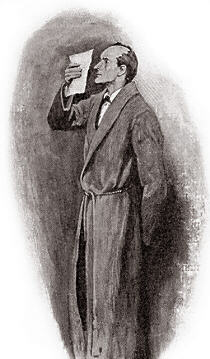| Sir Henry Baskerville 3 | Sir Henry Baskerville 4 |
“I presume, Doctor, that you could tell the skull of a negro from that of an Esquimau?”
“Most certainly.”
“But how?”
“Because that is my special hobby. The differences are obvious. The supra-orbital crest, the facial angle, the maxillary curve, the– –”
“But this is my special hobby, and the differences are equally obvious. There is as much difference to my eyes between the leaded bourgeois type of a Times article and the slovenly print of an evening half-penny paper as there could be between your negro and your Esquimau. The detection of types is one of the most elementary branches of knowledge to the special expert in crime, though I confess that once when I was very young I confused the Leeds Mercury with the Western Morning News. But a Times leader is entirely distinctive, and these words could have been taken from nothing else. As it was done yesterday the strong probability was that we should find the words in yesterday’s issue.”
“So far as I can follow you, then, Mr. Holmes,” said Sir Henry Baskerville, “someone cut out this message with a scissors– –”
“Nail-scissors,” said Holmes. “You can see that it was a very short-bladed scissors, since the cutter had to take two snips over ‘keep away.’”
“That is so. Someone, then, cut out the message with a pair of short-bladed scissors, pasted it with paste– –”
“Gum,” said Holmes.
“With gum on to the paper. But I want to know why the word ‘moor’ should have been written?”
“Because he could not find it in print. The other words were all simple and might be found in any issue, but ‘moor’ would be less common.”
“Why, of course, that would explain it. Have you read anything else in this message, Mr. Holmes?”
“There are one or two indications, and yet the utmost pains have been taken to remove all clues. The address, you observe, is printed in rough characters. But the Times is a paper which is seldom found in any hands but those of the highly educated. We may take it, therefore, that the letter was composed by an educated man who wished to pose as an uneducated one, and his effort to conceal his own writing suggests that that writing might be known, or come to be known, by you. Again, you will observe that the words are not gummed on in an accurate line, but that some are much higher than others. ‘Life,’ for example, is quite out of its proper place. That may point to carelessness or it may point to agitation and hurry upon the part of the cutter. On the whole I incline to the latter view, since the matter was evidently important, and it is unlikely that the composer of such a letter would be careless. If he were in a hurry it opens up the interesting question why he should be in a hurry, since any letter posted up to early morning would reach Sir Henry before he would leave his hotel. Did the composer fear an interruption – and from whom?”
“We are coming now rather into the region of guesswork,” said Dr. Mortimer.
“Say, rather, into the region where we balance probabilities and choose the most likely. It is the scientific use of the imagination, but we have always some material basis on which to start our speculation. Now, you would call it a guess, no doubt, but I am almost certain that this address has been written in a hotel.”
“How in the world can you say that?”
“If you examine it carefully you will see that both the pen and the ink have given the writer trouble. The pen has spluttered twice in a single word and has run dry three times in a short address, showing that there was very little ink in the bottle. Now, a private pen or ink-bottle is seldom allowed to be in such a state, and the combination of the two must be quite rare. But you know the hotel ink and the hotel pen, where it is rare to get anything else. Yes, I have very little hesitation in saying that could we examine the waste-paper baskets of the hotels around Charing Cross until we found the remains of the mutilated Times leader we could lay our hands straight upon the person who sent this singular message. Halloa! Halloa! What’s this?”
He was carefully examining the foolscap, upon which the words were pasted, holding it only an inch or two from his eyes.

“Well?”
“Nothing,” said he, throwing it down. “It is a blank half-sheet of paper, without even a water-mark upon it. I think we have drawn as much as we can from this curious letter; and now, Sir Henry, has anything else of interest happened to you since you have been in London?”
| Sir Henry Baskerville 3 | Sir Henry Baskerville 4 |